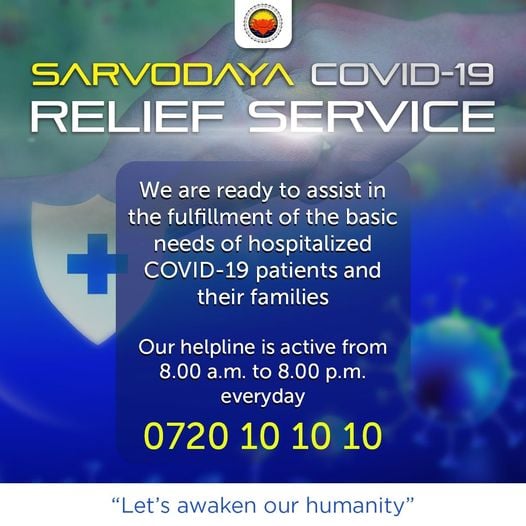Sri Lanka is experiencing a rapid increase in patients infected with COVID-19. As of end of April 2021, over 1000 cases per day have been reported for the 3 consecutive days. This is the largest number of cases reported per day, since the onset of the epidemic back in early 2020.
The epidemiological impact of “super spreader” events, which started on the 1st week of April, is surfacing only now, with exponential increase in the number of COVID-19 cases.
Current Situation
There is an imminent risk, that the public health system will be overwhelmed with this rising case load. If Sri Lanka sees a concurrent rise in Dengue cases which would also require ICU care for severe patients, there will be serious crisis in dearth of hospital beds and ICU facilities.
There is a dire need for rethinking of the treatment strategy; increasing number of level three care facilities and level two care facilities with oxygen therapy, getting the private sector engaged, and commencing of home and community-based care for the asymptomatic patients (estimated at 40%), with systems in place for getting them to level two and three care of tele-medicine, risk assessment tools and ambulance services.
With the large numbers of COVID-19 positive cases being reported, there are increasing social and psychological issues reported due to COVID-19 positive individuals being separated from their families and sent to treatment centers/hospitals far away from their residential areas/districts. This is mainly due to the lack of facilities in the health centers closest to the communities.
The Proposal
Sarvodaya is conversing with the government organizations to establish 1 or more new Intermediary Care Centers (ICC) at each district level so that all COVID-19 asymptomatic cases can be cared for in the district itself. Sarvodaya firmly believes that the best path ahead is to elicit the support of CSOs and NGOs to manage these centers similar to the private sector managed ICC model.
In addition, if we set up Community Care Centers (CCCs) in partnership with local CBOs/CSOs/NGOs, we could care for the people who have been in contact of COVID-19 positives patients who are unable to undergo home quarantine.
Private sector, religious, charitable, and non-governmental organizations with significant numbers of employees, and having residential facilities can be allowed to run isolation centers for their own staff. Pre-assessments and planning can already start to save precious time, as retrofitting existing facilities would require time and resources. Clear guidelines can be given, and simple written agreements can be signed if required. This would further reduce the burden on government run Intermediate Care Centers (ICCs).
Sarvodaya also proposes for preparation for home care for asymptomatic COVID-19 patients in the case the numbers continue to rise and the health care system gets overwhelmed. Home care guidelines should be developed and already kept ready in all 3 languages. If Home Care option is adopted, support services including advice through a hotline and ambulance services on stand-by need to be in place. Current village level COVID-19 prevention and control committees should be strengthened and expanded to be able to support the system.

Sarvodaya has launched a Relief Service already. Visiting homes and assessing their needs and then categorizing and addressing the level of care needed and assisting them to obtain those services and facilities.

Find the full proposal made to the government of Sri Lanka here –
We need your kind contributions to continue and enhance to a full fledged system as proposed. Please click on the below link and donate whatever amount is meaningful for you. Every dollar counts.




Leave a Reply
You must be logged in to post a comment.